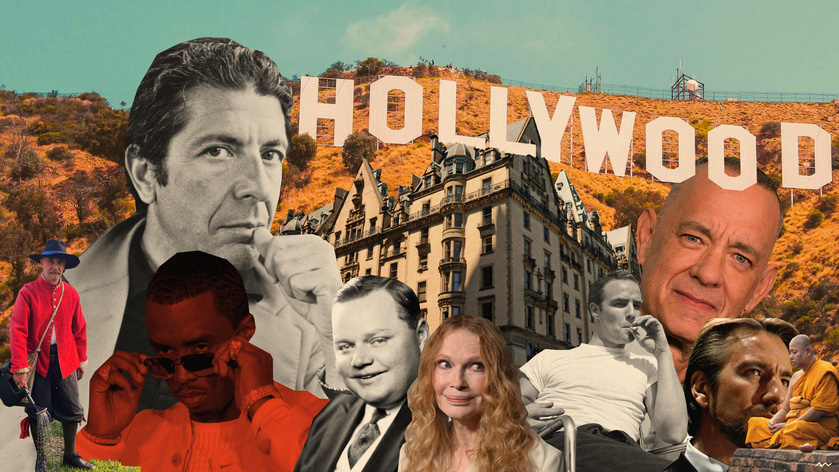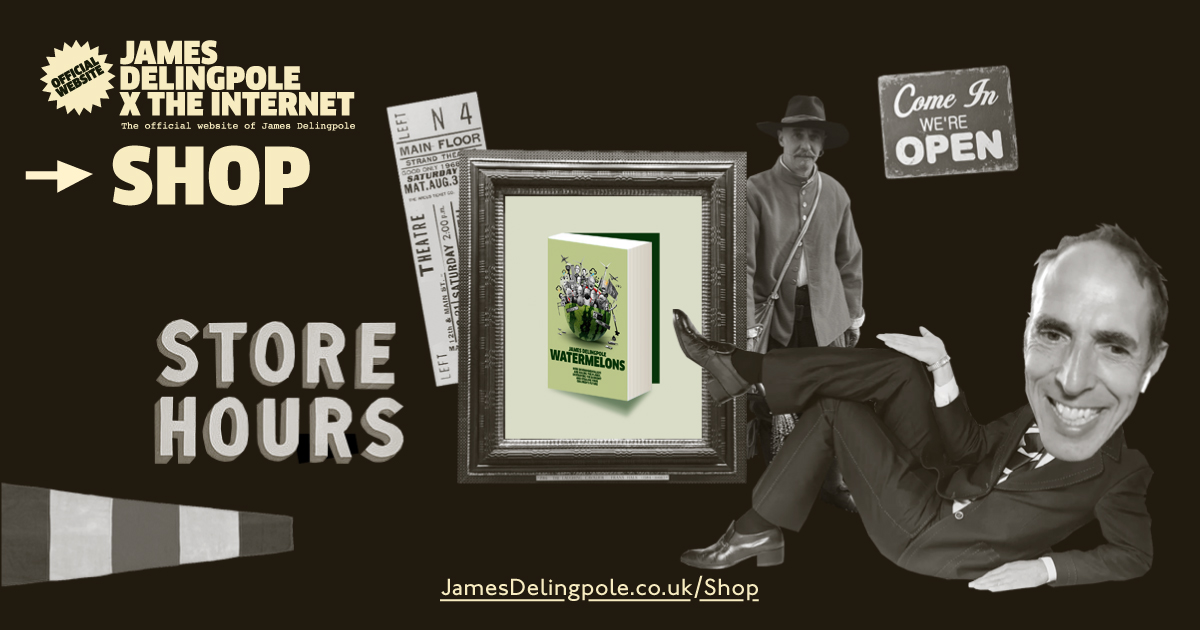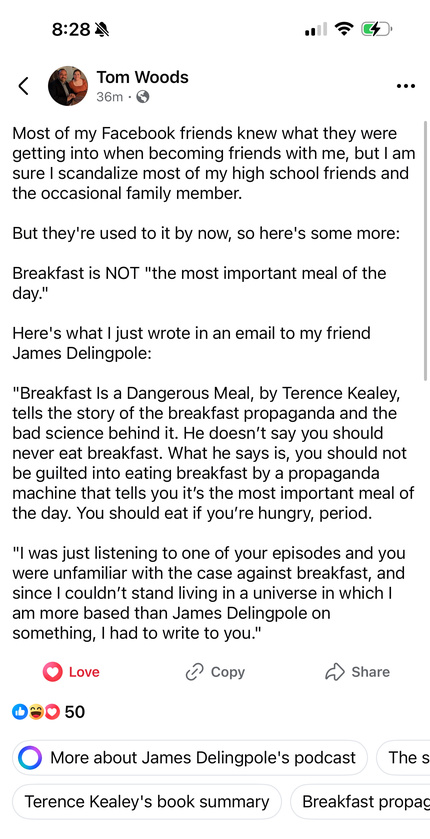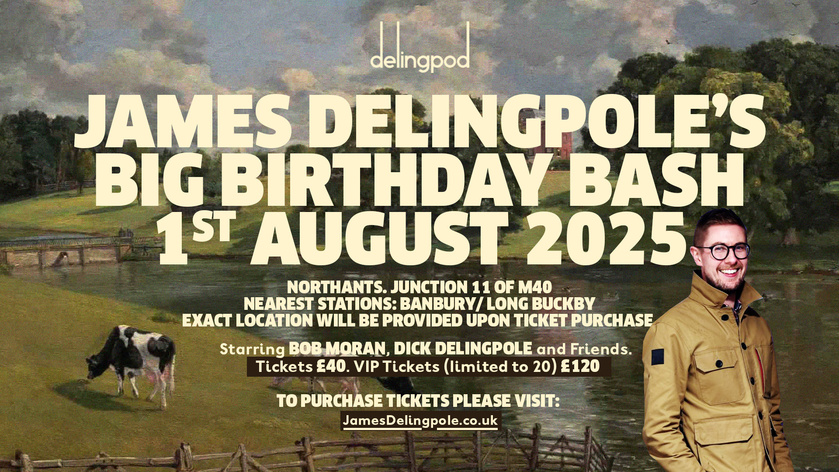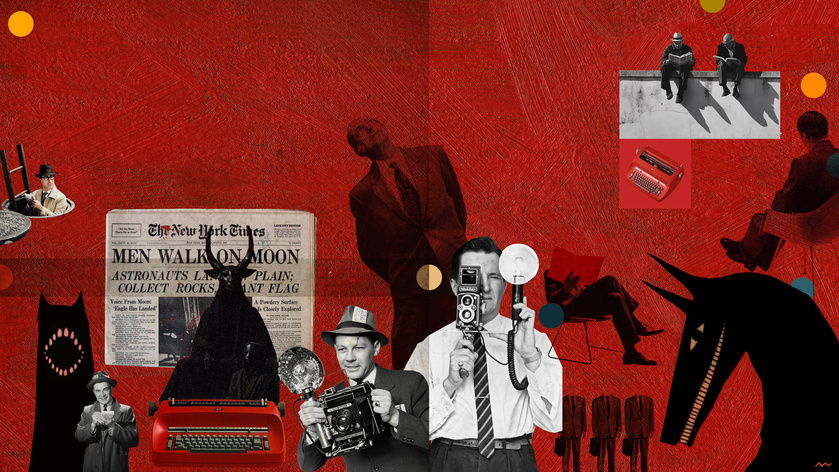When I was younger, my brother Dick has just reminded me, we went to a psychic fair and had our readings done by some kind of medium.
“Am I going to be famous?” I asked eagerly.
“I wouldn’t wish that on anyone,” the medium replied.
How wise that medium was. But I’m sure at the time that wisdom would have gone right over my head. Fame was the thing I wanted more than anything, even more than money.
“Ah but when you’re famous you get loads of money anyway”, would probably have been my reply to that particular point. “And lots of sex,” I would likely have been thinking also, this being my late adolescence when I thought of little else.
Why am I now so grateful to God that my dream never came true?
Here are a few reasons.
I was never required to marry a man pretending to be a woman nor to have to go to that celebrity hospital they all go to in LA where they pretend to have a baby which they then have to rear as if it is their own - but bring it up transgender, obviously, in homage to Baphomet.
I never had to be gang-raped by P Diddy (or similar) and his chums, then pretend it was completely normal and I hadn’t been affected by this thing I obviously couldn’t talk about.
I never have to remember to flash occult symbols - the all-seeing eye, the concealed hand, 666 etc - whenever I’m being photographed.
I don’t have to torture, rape and murder small children because Satan and his crew of junior evil deities find it pleasing.
I never have to attend award ceremonies.
I never had to participate in a humiliation ritual, like posing on the front of GQ in a dress. [It’s not just movie stars and rock stars who have to do this shit. Even F1 champions are not exempt]
I never have to worry that when I’m bustling about town or I’m out for a nice country walk someone might approach me from the bushes to whisper the trigger word that turns me suddenly into an MK Ultra assassin or means I suddenly shave my head and have to be dragged off to the clinic by my handler where I’m coshed with drugs until my reprogramming is complete.
I never had to sign the deal where in turn for selling your soul for all eternity you get a few years flying around in private jets - being bummed occasionally by P Diddy, obviously, but still - so long as you play your role and keep appearing on stage or screen long after your knackered limbs are begging you to retire.
Obviously, some readers will think that this is just “James being funny” or “James exaggerating.” And I’m happy for people to think that way, if it makes them feel better. But I do hope there’s at least one thing we can all agree on however far down the rabbit hole we might or not be: that becoming ‘famous’ is an experience so seductive in the youthful imagination and so unbearably hideous in reality that it can only be the work of the devil.
I mean this quite literally, of course. You are welcome to conceive of the devil as a figurative character if you prefer. But whether you understand the reality of the supernatural or you’re still hedging your bits the truth remains the same: you don’t get to be famous without selling your soul - and thereafter paying an unimaginably terrible price for it.
If you do agree with me on this, though, I think you’ll find that, even now, even after all we’ve seen - from MeToo to Epstein Island to Diddy , and all the way back to Fatty Arbuckle and beyond - we are still very much in the minority. I’d say most people out there in the world look at the lives of the famous and think: “I wouldn’t mind some of that.” And I’d say that, unfortunately, many young people continue to imagine - as I once did - that if only they could become famous it would solve all their problems.
There are lots of reasons why this is so but most of them can be summed up in one word: brainwashing. Or better still two words: Satanic brainwashing.
From birth we are put under an evil spell. A key part of this spell is relentless propaganda.
Look, if you can bear it, at any ‘serious’ newspaper on a Saturday or Sunday. It will be full of lovingly crafted articles by the best feature writers - I know because I used to be one of them - all of which start from the same basic premise: “This person is worthy of our attention because he or she is famous. Therefore what they say, however stupid, is really interesting. And we’re all kind of lucky to have spent time in their company - you to be reading about them and me to have landed the great gig of seeing them in the flesh.”
Meanwhile the tabloids are doing a similar job of keeping these celebrity creatures in the public eye by writing tittle tattle about their private lives in a way that implies that if you don’t know this stuff you are out of the loop.
And TV is doing the same by feting them on chat shows.
And charities and similar organisations are doing the same by appointing them as representatives or ambassadors.
Ditto all the major fashion labels who give them free clothes.
And the politicians who want to be seen rubbing shoulders with them because it shows they’re in touch with the kind of people the public like.
And the restaurants who put photographs of them on their walls because that will impress customers.
And the publishers who publish their (ghost-written) books.
And so on.
Essentially, it’s hard to go anywhere without getting this message, rammed down your throat, that being famous is where it’s at; and that if you’re not famous you are some kind of lesser being.
That’s why I don’t particularly blame myself for all the years I spent as a journalist bigging up all these tragic creatures, and wanting to rub shoulders with them in the hope that that some of their stardust might sprinkle onto me. It would be like blaming a Korean War prisoner who’d spent years being brainwashed in a Chinese POW camp for not saying anything critical about communism.
But I do find it interesting to analyse why it is that despite all the evidence out there to the contrary - and there’s an awful lot of it - so many of us are still beguiled by the cult of celebrity.
What it comes down to, I think, is the combination of the stories they (the deceivers) tell us - and the stories we tell ourselves as a consequence.
https://jamesdelingpole.locals.com/upost/6925787/jasun-horsley
Let me give you some thoughts arising from my recent podcast with Jasun Horsley who, like me, spent most of his life entranced by the fantasy of what he calls an ‘epic-Hollywood-sponsored life’ and ‘the culturally incepted dream of being a “star”’
He first visited it as a 20-year old, in recent receipt of a large inheritance, and has been infatuated with Hollywood ever since, writing a number of books on films and the movie industry, including 16 Maps of Hell, which I highly recommend.
Its subtitle - The Unraveling of Hollywood Superculture - gives you the gist. He describes the book as ‘a 600-page denunciation of pop culture and mass media as one giant mafia of soul control, heavily regulated by old seers hungry to fill their inner emptiness with endless slices of world domination.’
You don’t need to be a conspiracy theorist to enjoy the book. In fact it probably wouldn’t help if you are because in the chapter called Conspiracy Theory, the author tries rather too hard to keep a foot in the door of Normiedom by bracketing all conspiracy theorists with Alex Jones and David Icke and by pontificating, straw-man-ishly that ‘accurate interpretations of reality that are illegitimately arrived at are worse than worthless.’
[I have a go at him about this in our chat because I think it’s bollocks. You’ll have to listen to the podcast to find out why]
But I think that this is to the book’s advantage. It will help it sell more. Also, if readers think they are reading a Normie book it deactivates their deflector shield. This means that Horsley can get lots of viciously antipathetical home truths about fame and the entertainment industry through readers’ defences without their feeling that they are the victim of a secret authorial agenda to turn them into a tinfoil hat loon.
What Horsley very clearly demonstrates, with numerous facts and anecdotes, is that the movie industry, like the music industry, is and always has been operated by some very evil people and has always been about criminality and propaganda foremost, with entertainment coming a very poor third.
Take The Godfather, rated by many as among Hollywood’s top ten greats. It was financed with mob money - movies being handy for money-laundering because their accounting is so labyrinthine and opaque - and served a number of propaganda purposes. One was humanising ruthless criminal gangs by pretending that, really, it’s all about family - and we can all relate to family. Another, which Horsley doesn’t cover because I don’t think he’s quite far enough down that rabbit hole, was to misdirect attention towards the Italian mob and away from the (probably more dangerous and powerful) Jewish mob, which has called the shots in the US underworld since the days of Meyer Lansky.
You may have seen - perhaps even on my recommendation - The Offer, which was Paramount Plus’s seductive but sanitised take on the making of The Godfather, based on the memoirs of its producer Al Ruddy. The good guys - such as producer Robert Evans - are envy-inducingly cool and glamorous; even the bad guys, such as the mob bosses who supposedly wanted in on the project because they were just little kids at heart thrilled to see themselves on screen, are just lovable rogues. And the goal - in the teeth of resistance from shadowy, Philistine studio executives - is just to hang the expense and try to create as great a piece of art as possible, with the help of crazy genius talents like Marlon Brando and “Marty” Scorsese.
It’s fairytale nonsense of course. Real Hollywood is a shark-eat-shark world of gangsters, predatory paedophiles, Satanic ritual, blood sacrifice, mind-controlled stars and starlets from bloodline families being sexually abused, ripped off and exploited by their ruthless handlers.
Rarely has it displayed its evil more blatantly and vauntingly than in wife-beater, convicted paedophile and probably-much-closer-to-the-Manson-Family-murders-than-he-lets-on Roman Polanski’s 1968 horror ‘classic’ Rosemary’s Baby - in which (alleged) paedophile Woody Allen’s future wife Mia Farrow is drugged and coerced by a friendly-seeming coven in New York’s Dakota Building (where John Lennon was shot, probably by a US intelligence services assassin, who ensured that a mind-controlled patsy called Mark Chapman carried the can) into becoming pregnant with, quite literally, the spawn of the devil. [Sorry if I’ve spoiled the ending for you}.
If you read the preceding paragraph carefully, you may notice one or two clues which might raise the suspicion that there’s something not altogether right about Rosemary’s Baby. Never mind the artistry and the Oscar-winning acting and that killer twist at the end which I’ve ruined for you: this movie is a homage to Satan made by people who, if not in bed with Satan, not all of them anyway, are most definitely on his Christmas card list and would very likely have sat next to him on flights to Little St James had Epstein been in business at the time. If they’d advertised it as “Made by and for the Devil”, they could scarcely have been more blatant about its affiliations.
So how come nobody notices? Because we’ve all been programmed not to notice. We’ve been trained - good doggie - to use phrases like: “Oh c’mon. It’s only a movie.” We’ve been taught that films are primarily there to entertain us. We’ve been encouraged to think of actors’ ‘performances’ as something special which we should admire and maybe discuss afterwards. We’ve learned that if we’re really clever we should be capable of noticing more complicated stuff like lighting or cinematography or even colour palettes. We’ve become emotionally invested in the lives of these people thanks to the chat shows where they ‘reveal’ themselves to be charming, funny and likeable.
These people - the actors, the directors, and, most importantly, the people running them - are pros. They’ve got us looking at all the things they want us to look at. And ignoring all the things they want us to ignore.
And they’ve got us to do it by our own consent, that’s the key. If they had to tell us “Look. Don’t talk about the Satan/gangster/paedo/intelligence services/mind control stuff or we’ll sue you. Or kill you!”, they would have a much harder job. Endless injunctions and assassinations. But nobody, almost nobody, wants to think about the darkest underbelly of the entertainment industry because it’s just not in their interests. What the media wants, partly for the sales and partly because it’s complicit, is not the truth but the access. What the public wants is the dream. It’s not that, on some level or another, we’re any of us unaware that bad stuff goes on. It’s just that we’ve all acquired the mental knack of toning it down or even excusing it. Like: “Yeah, but that’s the Industry. People who go into it know the deal is. It’s always been that way…”
I was part of this lie factory for a while but I honestly didn’t know it was a lie factory. I just delighted to be paid to hang out with famous people, sometimes with foreign travel thrown in, and then write about it afterwards in a way that made both them and me look good. Obviously, if they were really unpleasant - the guy I found most obnoxious was the movie director Michael Mann - I wasn’t going to pull my punches. But what I mean is that I didn’t go into these encounters looking for trouble. I wanted to see the best in these people and take them more or less at their word because I wanted to feel like they were my new friends who would be nice to me if I ever bumped into them again. (Oddly, this did happen with Alan Rickman, whom I saw once or twice afterwards in our favourite clothes shop Margaret Howell). Which is why, for example, I could spend an hour in the company of Tom Hanks - who, I’ve since learned, is just about as loathsome a specimen as Hollywood has ever produced - and come away with the conclusion that he was just about the nicest guy you could ever meet and whom you’d happily trust to babysit your young kids.
But the thing I did even more often than movie star interviews and film reviews was write about rock music. I was a pop critic - and interviewer - for many years, and one of the people I would most have loved to interview, but never did, was Leonard Cohen.
Why Leonard Cohen? Well, obviously, for starters because his music was the sort of thing anyone with pretences to being one of the critical cognoscenti was supposed to like. Which I did - or thought I did - very much. Bird On A Wire, Suzanne, Famous Blue Raincoat and so on seemed to me to be great shagging music, great break up music, great music-to-slit-your-wrists-to music. Probably I would have used terms like ‘plangent’ and ‘melancholy’, which for critics, and rock connoisseurs generally are terms of great approbation. It’s considered a mark of sophistication to appreciate music - usually in minor keys - that makes you feel depressed.
Now that I’m Awake, I find it much harder to decide which of the music classics I like are objectively good, and which I was merely conditioned into thinking were good. But that’s a whole other essay.
Another thing I liked about Cohen is that he was clearly ironic. Clever people, or people who think they are clever, just love ‘irony’ because irony is something that goes over the head of the dumb masses. I now wonder whether the heavy promotion of ‘irony’ as a desirable thing wasn’t devised by sinister people at places like the Tavistock Institute to enable intellectuals to provide cover for the otherwise inexcusable. “Oh Tarantino isn’t actually endorsing and celebrating ultra violence. It’s just his ironic take on it,” etc.
Oh and yes, I’m sure his Jewishness would have appealed to me too. Back then I was under the Loxification spell which teaches us that though we’re all God’s creation and He loves us all, there’s a reason why the Jews are His favourites: they're just that little bit more intelligent, funny, talented. [Discovering that I secretly had Jewish ancestry was another thing I wanted to happen to me when I was younger]
Then, maybe most importantly, Cohen was known to give good interview: wry, amused, deadpan, droll, with lots of famous people from his past - Andy Warhol, Joni Mitchell etc to namecheck - and lots of life and career ups-and-downs to talk about, like the various cover versions of Hallelujah, his venture into synth-pop with Everybody Knows, the stint as a Zen Buddhist monk, and losing all his money to a dodgy accountant which forced him to go on the road once more to try to earn a crust.
But this story, as you may or may not know, has a massive twist. Jasun Horsley has a chapter on it in his book, though I was first alerted to it by this piece, published in January 2015, by Henry Makow.
The twist is this: all along Cohen was an Illuminati secret agent.
Yup. While we were all busy getting warm and gooey about what a charming, ironic, sexy, witty, lovable, talented, hummable, quotable old curmudgeon he was, Leonard Cohen was busy helping engineer our enslavement by the New World Order.
He was born into a bloodlines family that traced its roots back to Babylon. Trained under the MKUltra mind control programme, he first met Jacob Rothschild in 1959 (and went on to hang out with Barbara Hutchinson, Victor Rothschild’s ex-wife on the Greek island of Hydra), happened to be in Havana in Spring 1961 just days before the Bay of Pigs invasion (when he was arrested as a suspected CIA agent) and, as the Makow article puts it, ‘has an impressive record of appearing in distant locations just ahead of historical coups’.
Greece before the Colonels. London for Jimi Hendrix's death. Montreal on the eve of the War Measures Act. Israel just days before the Yom Kippur War broke out in a "surprise attack" by Egypt (September 1973). Asmara, Ethiopia for the CIA and Mossad-backed overthrow of Haile Selassie. Manhattan, when John Lennon died (December 1980).
He even - true to the Illuminati karmic laws: you’ve got to tell them what you’re doing - spells it out in his lyrics.
Field Commander Cohen was our most important spy
Wounded in the line of duty
Parachuting acid into diplomatic cocktail parties.
And what his mission is:
First we take Manhattan, then we take Berlin.
But we all just thought he was being clever and ironic, right?
I don't want to over-explain what ought to be an obvious point. But there’s a reason why the intelligence services term for a secret agent’s deep cover story is the same as the one we often apply to the biggest stars of the movie and music industries: legend.

